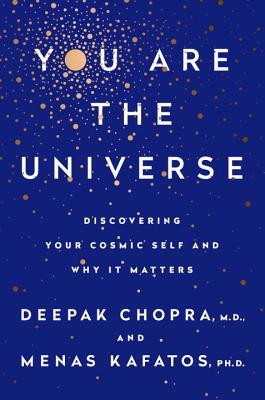
You Are the Universe: Discovering Your Cosmic Self and Why It Matters
Deepak Chopra, Menas C. Kafatos
About the Author
Questions & Answers
The human universe is a concept that posits the universe as a living, conscious entity, deeply intertwined with human consciousness. It suggests that the universe is not just a physical entity but a participatory system where human beings actively contribute to the creation and shaping of reality. This perspective emphasizes that consciousness is fundamental to existence, with the universe being an expression of consciousness itself.
In this view, consciousness is not just a human trait but a fundamental aspect of the universe, permeating all of existence. The human mind is a part of this cosmic consciousness, and through our thoughts, emotions, and perceptions, we influence the universe. This relationship implies that the universe is not static or random but dynamic and responsive to human participation, making it a "human universe."
The concept of the human universe challenges traditional scientific and philosophical paradigms by proposing that human consciousness is central to the universe's existence and functioning. This contrasts with the traditional scientific view that the universe operates independently of human consciousness and follows deterministic laws. Philosophically, it challenges materialism and dualism by suggesting that consciousness is not separate from matter but an intrinsic aspect of the universe. This idea also challenges the notion of a random, purposeless universe, advocating instead for a universe that is conscious, purposeful, and interconnected. The human universe concept encourages a reevaluation of consciousness, reality, and human potential, potentially leading to a new scientific framework that incorporates consciousness and purpose into its explanations.
The evidence supporting the idea that the universe is conscious comes from quantum physics, which shows that the quantum world behaves in ways that resemble consciousness. For instance, particles exhibit wave-particle duality and can be in multiple states simultaneously until observed, suggesting a form of awareness. This is known as the observer effect, where the act of observation affects the outcome.
In everyday life, this consciousness manifests through the interconnectedness of all things. The universe responds to our thoughts, emotions, and actions, influencing our experiences. This is evident in phenomena like synchronicity, where events seem to occur in a meaningful way without a causal connection. Additionally, the concept of free will suggests that our choices shape reality, implying a level of consciousness beyond the physical. This perspective encourages personal growth, self-awareness, and the belief in a meaningful and purposeful existence.
The concept of the human universe reshapes our understanding of life, death, and existence by emphasizing human consciousness as central to reality. It suggests that the universe is a participatory, conscious entity, and humans are not passive observers but active creators of their reality. This shifts the focus from randomness and determinism to purpose and meaning, as the cosmos is seen as a conscious, purpose-driven system. Life is no longer just a biological process but a journey of self-discovery and realization of our cosmic nature. Death, instead of being the end, is seen as a transition to a timeless, eternal state, where the individual consciousness continues to evolve. The meaning of existence is redefined as the pursuit of self-awareness and the realization of our potential within the vast, interconnected consciousness of the universe.
The concept of the human universe, where human consciousness shapes reality, has profound implications for science, technology, and human behavior:
Science: It challenges traditional scientific paradigms, suggesting that consciousness is integral to the universe's fabric. This could lead to new scientific inquiries into the relationship between mind and matter, potentially revealing new dimensions of reality.
Technology: The human universe could inspire technology that aligns with human consciousness, fostering technologies that promote healing, wholeness, and enlightenment. This could shift the focus from materialistic advancements to those that enhance human well-being and consciousness.
Human Behavior: It encourages a shift from a passive acceptance of reality to an active participation in creating it. This could lead to more mindful and purposeful actions, fostering a sense of responsibility and connection to the cosmos. It may also promote a more compassionate and cooperative society, as individuals recognize their interconnectedness with others and the universe.
